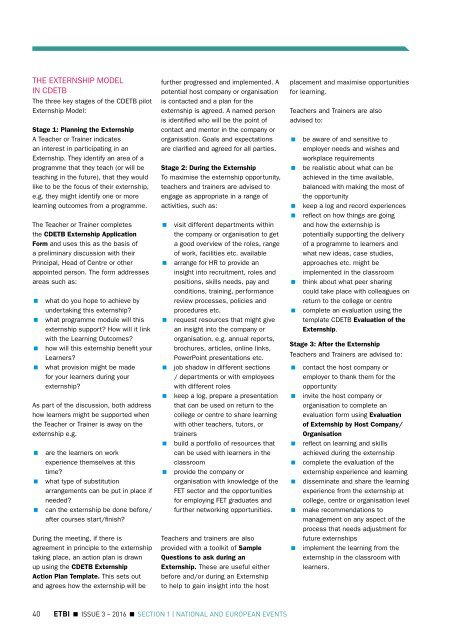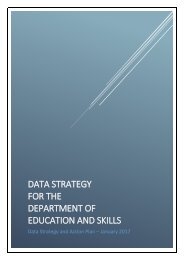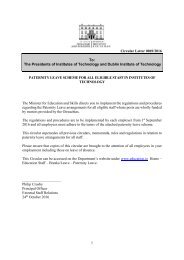ETBI-News-Summer-2016-web
ETBI-News-Summer-2016-web
ETBI-News-Summer-2016-web
You also want an ePaper? Increase the reach of your titles
YUMPU automatically turns print PDFs into web optimized ePapers that Google loves.
The Externship Model<br />
in CDETB<br />
The three key stages of the CDETB pilot<br />
Externship Model:<br />
Stage 1: Planning the Externship<br />
A Teacher or Trainer indicates<br />
an interest in participating in an<br />
Externship. They identify an area of a<br />
programme that they teach (or will be<br />
teaching in the future), that they would<br />
like to be the focus of their externship,<br />
e.g. they might identify one or more<br />
learning outcomes from a programme.<br />
The Teacher or Trainer completes<br />
the CDETB Externship Application<br />
Form and uses this as the basis of<br />
a preliminary discussion with their<br />
Principal, Head of Centre or other<br />
appointed person. The form addresses<br />
areas such as:<br />
what do you hope to achieve by<br />
undertaking this externship?<br />
what programme module will this<br />
externship support? How will it link<br />
with the Learning Outcomes?<br />
how will this externship benefit your<br />
Learners?<br />
what provision might be made<br />
for your learners during your<br />
externship?<br />
As part of the discussion, both address<br />
how learners might be supported when<br />
the Teacher or Trainer is away on the<br />
externship e.g.<br />
are the learners on work<br />
experience themselves at this<br />
time?<br />
what type of substitution<br />
arrangements can be put in place if<br />
needed?<br />
can the externship be done before/<br />
after courses start/finish?<br />
During the meeting, if there is<br />
agreement in principle to the externship<br />
taking place, an action plan is drawn<br />
up using the CDETB Externship<br />
Action Plan Template. This sets out<br />
and agrees how the externship will be<br />
further progressed and implemented. A<br />
potential host company or organisation<br />
is contacted and a plan for the<br />
externship is agreed. A named person<br />
is identified who will be the point of<br />
contact and mentor in the company or<br />
organisation. Goals and expectations<br />
are clarified and agreed for all parties.<br />
Stage 2: During the Externship<br />
To maximise the externship opportunity,<br />
teachers and trainers are advised to<br />
engage as appropriate in a range of<br />
activities, such as:<br />
visit different departments within<br />
the company or organisation to get<br />
a good overview of the roles, range<br />
of work, facilities etc. available<br />
arrange for HR to provide an<br />
insight into recruitment, roles and<br />
positions, skills needs, pay and<br />
conditions, training, performance<br />
review processes, policies and<br />
procedures etc.<br />
request resources that might give<br />
an insight into the company or<br />
organisation, e.g. annual reports,<br />
brochures, articles, online links,<br />
PowerPoint presentations etc.<br />
job shadow in different sections<br />
/ departments or with employees<br />
with different roles<br />
keep a log, prepare a presentation<br />
that can be used on return to the<br />
college or centre to share learning<br />
with other teachers, tutors, or<br />
trainers<br />
build a portfolio of resources that<br />
can be used with learners in the<br />
classroom<br />
provide the company or<br />
organisation with knowledge of the<br />
FET sector and the opportunities<br />
for employing FET graduates and<br />
further networking opportunities.<br />
Teachers and trainers are also<br />
provided with a toolkit of Sample<br />
Questions to ask during an<br />
Externship. These are useful either<br />
before and/or during an Externship<br />
to help to gain insight into the host<br />
placement and maximise opportunities<br />
for learning.<br />
Teachers and Trainers are also<br />
advised to:<br />
be aware of and sensitive to<br />
employer needs and wishes and<br />
workplace requirements<br />
be realistic about what can be<br />
achieved in the time available,<br />
balanced with making the most of<br />
the opportunity<br />
keep a log and record experiences<br />
reflect on how things are going<br />
and how the externship is<br />
potentially supporting the delivery<br />
of a programme to learners and<br />
what new ideas, case studies,<br />
approaches etc. might be<br />
implemented in the classroom<br />
think about what peer sharing<br />
could take place with colleagues on<br />
return to the college or centre<br />
complete an evaluation using the<br />
template CDETB Evaluation of the<br />
Externship.<br />
Stage 3: After the Externship<br />
Teachers and Trainers are advised to:<br />
contact the host company or<br />
employer to thank them for the<br />
opportunity<br />
invite the host company or<br />
organisation to complete an<br />
evaluation form using Evaluation<br />
of Externship by Host Company/<br />
Organisation<br />
reflect on learning and skills<br />
achieved during the externship<br />
complete the evaluation of the<br />
externship experience and learning<br />
disseminate and share the learning<br />
experience from the externship at<br />
college, centre or organisation level<br />
make recommendations to<br />
management on any aspect of the<br />
process that needs adjustment for<br />
future externships<br />
implement the learning from the<br />
externship in the classroom with<br />
learners.<br />
40 <strong>ETBI</strong> issue 3 – <strong>2016</strong> Section 1 | National and European Events





